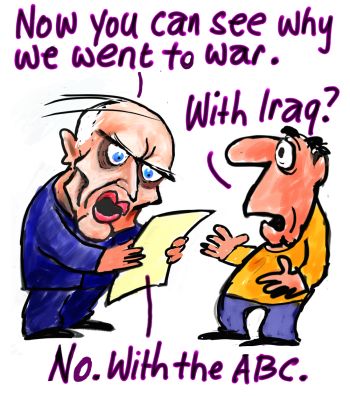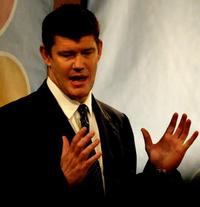
December 31, 2006 by Electronic Iraq
An existential question: If journalism is the first draft of history, then what is journalism that denies history? Is it still journalism?
The question came to mind Friday night as CNN's Anderson Cooper led Americans through the initial moments following the execution of Saddam Hussein.
Conveniently carried out just five minutes past the hour when "Anderson Cooper 360" goes on the air, the execution provided an opportunity for viewers to think about the long story of the Iraqi leader's brutal reign. Yet when it came to informing the audience about one key aspect of that history - the role of the United States in helping to create and maintain the "butcher of Baghdad" - CNN offered only amnesia.
Throughout the CNN broadcast, as news gradually trickled in concerning the details of the execution, viewers were treated to a highly selective loop of stock images of the condemned: Saddam brandishing a tribal sword offered as a gift by one of his fawning subjects, Saddam firing a gun, Saddam laughing his cartoonish dictator laugh, Saddam defiantly reading a statement at the start of the U.S. invasion in 2003, Saddam smoking a cigar, Saddam being checked for lice by U.S. military doctors, Saddam wildly gesturing during his recent trial.
And the photo of Saddam shaking hands with U.S. envoy Donald Rumsfeld back in December 1983? Absent. With the inevitable headline ("Death of a Dictator") already in place, the storyline was set. This was to be about Saddam facing "justice" for crimes that he alone committed. The U.S. presence in the story was to be, at most, a ghostly one limited to providing legal and moral guidance from behind the scenes. As if to confirm this paternalistic and self-serving fiction, CNN's Elaine Quijano dutifully reported from Waco that President Bush, not wanting to appear that he was "gloating" over the final humiliation of the Iraqi leader, was keeping a low profile.
Viewers who were dissatisfied with "Anderson Cooper 360" might have found themselves turning to the New York Times for a better sense of perspective. Yet while yesterday's obituary in the Times was impressive for its length (over 5000 words), it provided little more in terms of historical context.
Rather than offering readers a responsible assessment of their own government's role in the life and crimes of the Iraqi leader, author Neil MacFarquhar elected to repeat the kind of sensational details Americans have come to expect when the country's designated enemies are profiled: Saddam as megalomaniac (he believed "he was destined by God to rule Iraq forever" and possessed "boundless egotism and self-delusion"), Saddam as Mafioso (the "Corleone-like feuds" of his family "became the stuff of gory public soap operas"), Saddam as traumatized child ("persistent stories suggest that Mr. Hussein's stepfather delighted in humiliating the boy and forced him to tend sheep"), Saddam as sadistic murderer (while reading the names of Baath party officials allegedly involved in a supposed coup plot, "Mr. Hussein paused from reading occasionally to light his cigar, while the room erupted in almost hysterical chanting demanding death to traitors"), Saddam as narcissist ("He dyed his hair black and refused to wear his reading glasses in public, according to interviews with exiles"), Saddam as paranoid ("Delicacies like imported lobster were first dispatched to nuclear scientists to be tested for radiation and poison"), and on and on.
And the inconvenient history of U.S. support for the man now being mentioned in the same breath as Hitler, Stalin and Pol Pot? Aside from a single reference to the U.S. decision to back Iraq in its war with Iran, the obituary is silent.
All other references to the U.S. cover events from 1990 onwards. The choice of verbs tells it all: Saddam, his regime, and his country are variously described as being "toppled," "routed," "penetrated," and "expelled" by U.S. military might. One has to look to the bloggers, muckrakers and scholars to find the verbs that tell the rest of the story: "installed," "provided," "enabled," "encouraged," and "sold."
Reading and watching the kind of mainstream coverage provided by CNN and the New York Times during the last 48 hours, one could be forgiven for believing that the relationship between Saddam and the U.S. had always been one of enmity and violence. Yet as Juan Cole and others have tirelessly pointed out, the U.S. government began "enabling" Saddam as early as 1959 when the CIA enlisted his help in undermining the government of Abdul Karim Qasim.
The cozy relationship, which it now appears included U.S. support for the coup that put Saddam in power in 1968, continued into the 1980s. The infamous Rumsfeld visit symbolized the U.S. policy of providing military and diplomatic assistance to the Iraqi regime in its catastrophic war with Iran. Cole points out that Secretary of State George Shultz even went so far as to shield Saddam from a possible UN condemnation for Iraq's use of chemical weapons against Iran.
At a time when the airwaves are filled with pious reminders of the need to "remember the victims" of Saddam's brutality, how are we to read the systematic absence of references to the U.S. role in helping to produce these and other victims? It seems that while President Bush was keeping a "low profile" in Waco, the corporate media were safely ensconced in a bunker of amnesia. Indeed, "low profile" is an apt description for the way that the corporate media continue to treat the scandalous history of U.S. support for repressive regimes across the globe.
In his enormously useful book States of Denial (Polity Press, 2001), Stanley Cohen argues that most denial can be divided into three categories: literal denial ("it did not happen"), interpretive denial ("it happened, but it's not what it looks like"), and implicatory denial ("it happened, and it is what it looks like, but there's nothing wrong with it"). In other words, we tend to deny either the facts, the interpretation of the facts, and/or the moral implications of the facts.
In the rush to celebrate the death of the "butcher of Baghdad," we are up to our necks in all three types of denial. The failure to provide a full account of this horrifying chapter of Iraqi and American history is, to be sure, an act of literal denial. If two leaders shake hands, but the photo is not shown on CNN, did they really shake hands? One is reminded of the oft-quoted statement by an anonymous New York Times staff member: "If the Times wasn't there, it didn't happen."
Of course, the facts about the U.S. role in Saddam's brutality are not always literally denied, and this is where the second and third types of denial come into play. No doubt in the coming days we will hear numerous commentators attempt to "spin" the facts, as has often happened in discussions of U.S. ambassador April Glaspie's famous "green light" to Saddam just before Iraq's 1990 invasion of Kuwait. It wasn't really a green light, we'll be told. Yes, it was a handshake, but that doesn't mean it was an endorsement of Saddam's policies.
The boldest (and, one must add, the most honest) defenders of U.S. policy will employ the language of implicatory denial, insisting, when pressed, that U.S. support for Saddam was justified under the circumstances. We'll be told that the realities of the Cold War, or the struggle against the threat posted by the Iranian revolution, or the need for maintaining U.S. access to cheap fossil fuels, created a context in which the U.S. had no choice but to get its hands dirty.
In this light, it seems that the initial coverage of Saddam's execution has served as a collective ritual hand-washing designed to reassure Americans that they really are the blameless leaders of a cosmic struggle against "evil." And so the answer to the existential question comes into view. Today's mainstream journalism, even "live" TV, is a far cry from the first draft of history. Instead, it functions largely as a transmission of selective history that has been drafted--and airbrushed, and sanitized, and rearranged, and distorted--long before it ever reaches our eyes and ears.
John Collins is Associate Professor of Global Studies at St. Lawrence University in Canton, NY. He is the author of Occupied by Memory: The Intifada Generation and the Palestinian State of Emergency (NYU Press, 2004) and the co-editor of Collateral Language: A User's Guide to America's New War (NYU Press, 2002).























